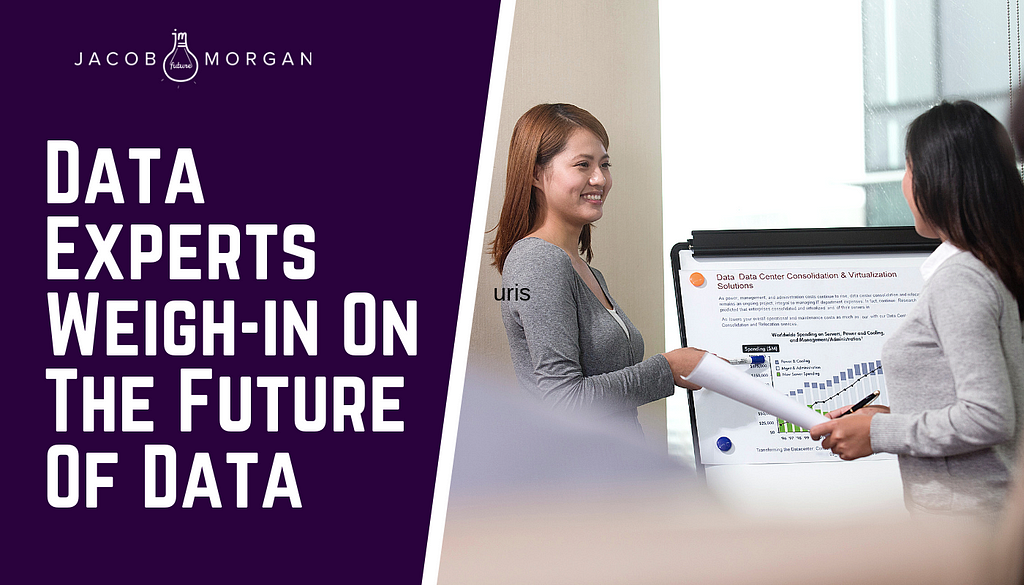Data Experts Weigh-in On The Future Of Data

Data is everywhere. From surveys and website tracking to wearable devices and people analytics, today's world is driven by data. Things will only grow as we trek towards the future of work. Each week I talk to leading futurists on my podcast, The Future of Work Podcast, and the topic of data frequently comes up. Here are what some of my recent guests have said about data, how we can use it, and what organizations and employees need to do to better leverage it.
Natalie McCullough, General Manager of MyAnalytics and Workplace Analytics at Microsoft, leverages data to maximize the workforce. Using data, she can tell what makes employees engaged and the impact leaders have on employee engagement. At Microsoft, each employee has access to their own analytics that shows how much time they spend in meetings, checking email, or multi-tasking. The idea is that employees can use their own data to be more efficient and track their productivity.
Natalie admits that data can be overwhelming, but she suggests managers start by experimenting with something small and not biting off more than they can chew. She recommends starting with one area of data for just one part of the company, and then expanding that as people adjust. When using data, transparency and a growth mindset are key. Employers don't need to collect unnecessary data or breach privacy, but they can use data to improve their organization and the lives of their employees.
Data security and perception was also a common theme with Tracy Reinhold, Chief Security Officer at Fannie Mae. He says the most important thing about data is its integrity. Having someone assigned to data security is helpful, as is making sure all employees take ownership in their responsibility to protect the data. Leaders also need to be able to tell their employees why storing data is important so employees don't feel they are being watched for no reason. Together, employees, information security, and physical security work together to protect the interests of the organization and its customers.
Jenny Dearborn, Chief Learning Officer and Senior Vice President at SAP, believes data can be used everywhere, even in areas that are difficult to measure, like leadership. Leaders can use data by looking at their organization to see what is broken and what goals they have. They can then find data points to support and measure their goals and track progress. For example, a leader may want to improve innovation, which means increasing the productivity of the key innovators by tracking employee engagement. Jenny says leaders can start with the big picture and then peel off every layer and get all the way down to the ground and understand if the actions they are taking are getting them to their goal by looking at the right kind of data. The more different data sources you can put together in one analysis, the more insight you're going to be able to get from the data.
Jeremy Welland is the Global Head of People Analytics at PayPal Holdings, Inc. His job involves building out a people data warehouse so the company has a single true source of data, plus overseeing business intelligence, data analysis, and machine learning. He predicts that in the future, data silos will be broken down and a lot of what he does will blend together. Leaders who will be most successful are the ones who can pull together all of the data pieces to make sure that the data is secure, connected, and available to the right people.
In the future, people who are willing to learn new technology and tools will have the most success with data so they can bring information together seamlessly to answer questions quickly for leaders. But looking at numbers and performing analyses is worthless is nothing is done with it. As Jeremy says, you can't have insights without action. It's the role of the data employees to translate insights into things that can be used by the company to grow strategically.
Author Bill Schmarzo is the Chief Technology Officer for Dell EMC's Big Data Practice, where he advises companies on how to start their big data journeys. From Bill's experience, most companies want to do something with all the data that is available to them, but they aren't sure how to do it. Instead of just looking at data to see what happened in the past, companies need to use it strategically to power their business model. According to Bill, data is nothing on its own -- the analytics and strategy are what turn those numbers into something companies can use. Ask questions first, find the right data, and then use that data to answer questions and find solutions. Everyone, no matter where they are in the company, needs to understand the basics of data and not be afraid of what big data and machine learning will be capable of in the future.
Data will definitely play a growing role in the future of work, and just like these data experts said, the employees and organizations that can best understand the technology and processes can have great success.
Learn the proven & powerful concepts in today's most effective organizations with my free training series on Employee Experience here.
Data Experts Weigh-in On The Future Of Data was originally published in Jacob Morgan on Medium, where people are continuing the conversation by highlighting and responding to this story.









